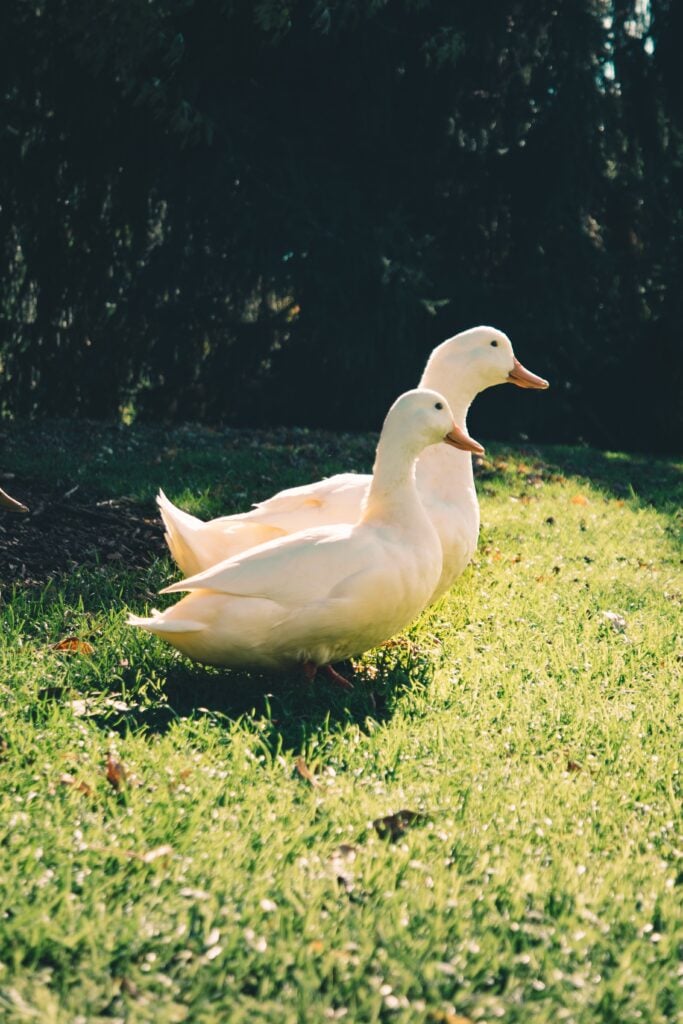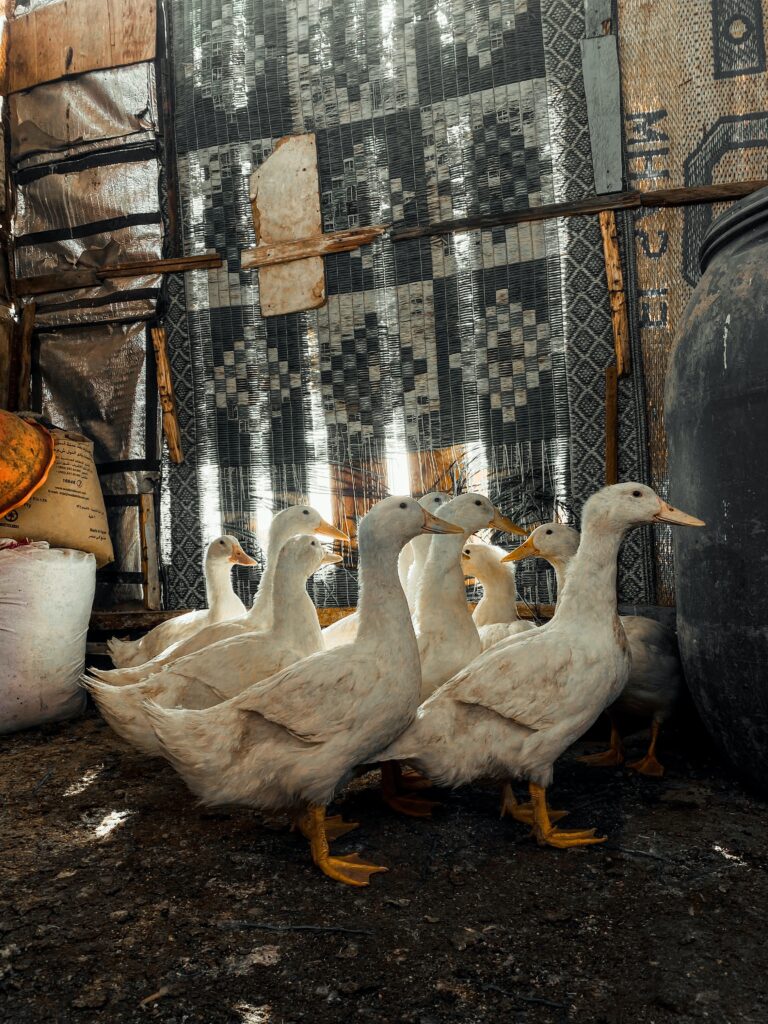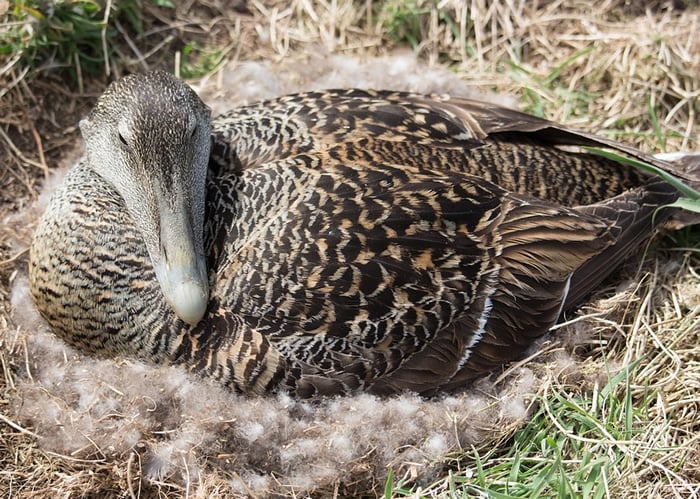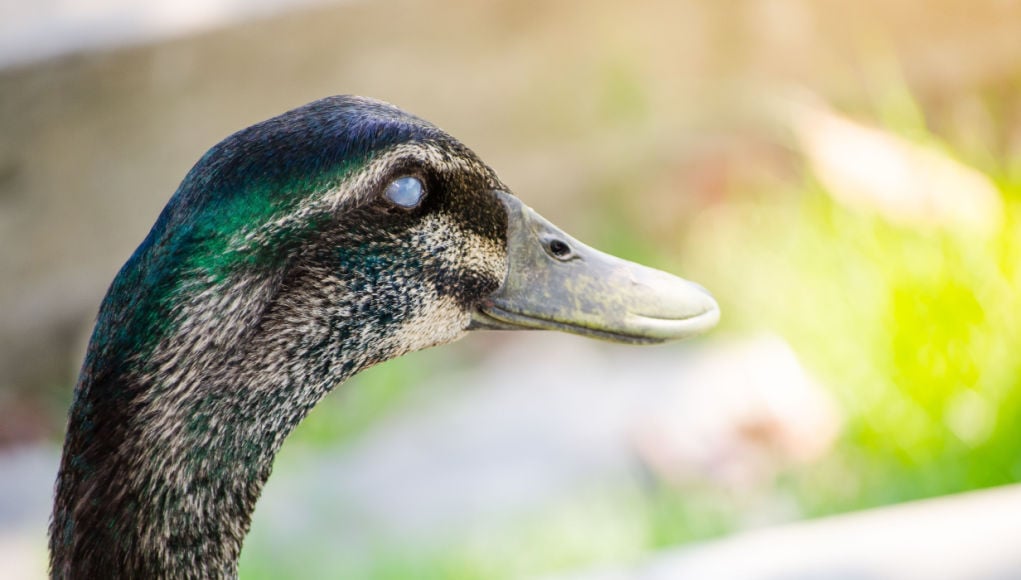Do ducks get stressed?
Well, the straightforward answer is… Yes!
And too much of it could be dangerous or even deadly for your beloved fowl.
In this piece, we’ll dive into what causes stress in ducks, how to tell if your ducks are stressed, and how to help out your flock in times of stressful situations.
Let’s get started!
How To Tell If a Duck Is Stressed
Even though ducks can’t talk, they have a few strong indicators that you can use to tell how they’re feeling and if they need help reducing their cortisol levels.
Here are some of the most obvious signs you should pay attention to as a duck keeper.
Examine the Feathers
This fascinating study by theUniversity of Saskatchewanrevealed that duck feathers show the impact of stress in strong, measurable ways.
Duck feathers containcorticosterone, a stress hormone, and researchers can measure its levels to tell exactly how stressed a duck has been.
Duringmolting, birds produce new feathers that absorbcorticosteronefrom the blood, reflecting their physiological state and stress levels.
These young feathers are called “pin” or “blood” feathers.
The research mentioned above involvedLesser Scaup ducks, where one group was exposed to reduced food for two weeks.
The ducks with decreased food showed higher corticosterone levels in their feathers.
As it turns out, this higher stress hormone can harm cognitive ability, growth, reproduction, and overall survival.
Understanding these stressors helps scientists comprehend environmental conditions and the impacts of climate change on wildlife.
Identifying chronic stressors is crucial in addressing climate change’s complex challenges.
On a more applicable level for everyday people like you and me, we can look for ruffled feathers, discoloration, missing feathers (this is only applicable outside of molting season), and dull feathers that have lost their vibrancy.
Fewer or No Eggs
Ducks are generally noted as strong layers.
So if they slow or stop their egg production, that indicates they are stressed about something.
Stress disrupts the hormonal balance necessary for egg production.
When ducks experience stress, their body prioritizes survival over reproduction, leading to a decrease or cessation of egg-laying.
Weight Loss and Loss of Appetite
It’s not easy to notice weight loss in a bird, so if things have progressed enough to be noticeable, your birds are in danger.
If you can catch this symptom while it’s a loss of appetite and not yet significant weight loss, you’ll have better odds of finding and correcting the source of stress before it’s too late.
Stress can disrupt the normal functioning of their digestive system and suppress their appetite.
Releasing stress hormones can affect their feeding motivation and reduce their interest in food.
Additionally, stress can lead to changes in behavior, such as decreased activity and withdrawal, which can further contribute to decreased food intake.
It’s often a side effect of depression, which is another sign of stress.
Depression
Stressed ducks lose their joy and desire to interact with their flock and explore their surroundings.
Depression in a duck sometimes mirrors depression in humans.
This includes isolation, lethargy, tiredness, loss of appetite, loss of personality, reduced activity, reduced social interactions with ducks and people, and a lack of cleanliness because of reduced grooming habits.
Lethargy
Stress takes the energy out of everyone, including ducks.
A distressed duck may sit or lay down more, sleep more often, and refrain from free-ranging far from the coop.
Someducks may not leave the coopif it has progressed too far.

What Causes Stress in Ducks?
Almost anything could cause ducks to stress, so try to think like a duck and imagine what may upset or distress your flock.
Beyond that, though, here are a few common situations that will raise your ducks’ cortisol levels and cause intense stress.
Significant Environmental Changes
Ducks can experience stress when their environment undergoes sudden or significant changes.
这可能包括改变温度,财富er conditions, habitat disruption, or exposure to unfamiliar or noisy surroundings.
Rearranging or changing their coop or run may also stress your ducks out.
These are curious and attentive creatures; something as simple as changing their feeder or watering container raises the alarm for ducks.
Too much change makes them feel unsafe and uneasy, leading to stress.
Predators or Perceived Predators
The presence of predators, real or perceived, can induce stress in ducks.
The fear of predation can lead to heightened vigilance, decreased feeding, and overall anxiety.
Common predators include humans, dogs, housecats, wild animals, birds of prey, and overbearing flock members.
Loud noises, flashing lights, and other nuisances for humans will make your ducks uneasy and stressed too.
Building projects, busy roads, and new livestock on your property are all good possibilities here.
Overhandling your ducks, especially when they don’t know or trust you yet, can be distressing for them too.
If you have small children, they could also cause stress.
While their intentions are often good, too much of their presence can overwhelm your ducks.
Make sure that your children and ducks are slowly acclimated to one another over a longer period of time.
Always monitor your younger children when they are first learning how to interact with ducks; this will keep both safer and reduce stress levels for everyone involved.
Changed Hierarchies and Other Social Disruptions
Ducks are social animals, and disruptions within their social structure can cause stress.
This may include changes in flock dynamics, territorial disputes,aggression from other ducks, or isolation from their favorite companions.
Someducks breedsare more aggressive than others too.
Do your best to evenly match aggressive or docile breeds up so that your birds aren’t experiencing any severe bullying.
Poor Nutrition
Insufficient access to food, poor-quality feed, or competition for resources within a group of ducks can induce stress.
Inadequate nutrition can lead to physical discomfort and compromised health.
As you can imagine, worrying about the next meal, not feeling full, or feeling desperate for certain nutrients can put your ducks into upsetting mindsets.
This leads to serious stress and poor overall wellness — mentally, emotionally, and physically.
Poor Living Conditions
Ducks have to have clean, secure habitats that are enriching, with plenty of space, friends, and food.
Ducks are messy creatures.
But that doesn’t mean that they don’t need clean spaces with plenty of fresh, clean water that’s suitable for swimming and drinking.
Many people underestimate how messy ducks are and how much work they require.
This is a sad yet all-too-common issue that overwhelmsbeginner duck keepersand stresses out the entire duck flock.
Health Problems, Injury, or Illness
Illness, infections, or chronic health conditions can cause stress in ducks.
Physical discomfort, pain, and compromised immune function can increase stress levels.
Ducks don’t know if their ailments are serious, life-threatening, short, or long-lived.
They don’t know if or when they will get better, and that is incredibly upsetting for them.
Relocation
Ducks may experience stress during transport or when moved to a new location.
The confinement, noise, and unfamiliar surroundings can be highly stressful for them.
Relocation may be a different coop that’s still on your property.
It could also mean rehoming the duck to new people on new land.
Or it can also be quick trips away from home, like shows, fairs, veterinary checkups, or visits to a friend’s house while you leave for vacation.
Again, ducks don’t know if these changes are permanent or temporary.
And they also don’t yet know if these changes are safe or helpful.

How to Help a Stressed Duck
If you have a stressed duck, there are several steps you can take to help alleviate its stress and promote its well-being.
Here are some ways to help a stressed duck:
Create a safe and secure space
Ensure the duck’s living environment is quiet, calm, and free from excessive disturbances or loud noises.
Create a safe and secure space for the duck to retreat to when it feels stressed or anxious.
Minimize potential stressors
Identify and minimize any potential stressors in the duck’s environment.
This may include addressing factors such as extreme temperatures, predatory threats, social disruptions, or changes in routine.
Provide a consistent and predictable environment to help the duck feel more secure.
Give a balanced and nutritious diet
Ensure that the duck is receiving a balanced and nutritious diet appropriate for its age and species.
Proper nutrition plays a crucial role in supporting overall health and reducing stress.
Consult with a veterinarian or avian nutritionist for guidance on suitable feed and supplements.
Provide appropriate social interactions
Ducks are social animals, so providing appropriate social interactions and companionship can help alleviate stress.
If the duck is solitary, considerintroducing it to compatible duckcompanions.
Monitor the interactions to ensure they are positive and not causing additional stress.
Ducksneedother ducks.
Chickens are better than solitary confinement, but not enough to keep a duck happy and thriving alone.
Handle them with Care
Handle your ducks gently, respectfully, and with care during routine care activities, such as feeding, cleaning, and health check-ups.
Minimize unnecessary stress during handling and avoid rough or aggressive handling techniques.
If your ducks are new to you, give them several weeks of observing you being helpful (feeding, watering, cleaning up) before you approach them and try to become their friend.
When you are ready to get friendly, be patient, and bring many healthy treats.
Provide environmental enrichment
Environmental enrichment helps keep ducks mentally stimulated and engaged.
This can include offering toys, access to water for swimming, and opportunities for natural behaviors like foraging.
Enrichment can also help reduce boredom and stress.
Consult with a veterinarian
If the duck’s stress persists or if there are signs of underlying health issues, consult with a veterinarian who has experience with avian species or a knowledgeable, experienced duck keeper.
They can thoroughly examine, diagnose any underlying conditions, and provide appropriate treatment or recommendations.
Can Stress Kill a Duck?
Yes, stress can have severe consequences and even be life-threatening for ducks.
Prolonged or intense stress can negatively impact their health and well-being, weakening their immune system and making them more susceptible to diseases and infections.
Intense stress can lead to heart attacks, seizures, and death in some circumstances.
Many small animals have died of stress brought on by dogs.
Even though the dogs may not have touched the animals, their barking, chasing, and intensity can be enough to be deadly– especially for sensitive ducks.
Do your best to not only be predator-proof but also keep dangerous outsiders, like neighborhood dogs, at bay.
Additionally, chronic stress can lead to decreased appetite, weight loss, hormonal imbalances, reproductive issues, and other physiological disturbances that can seriously affect their overall health.
Therefore, it is important to minimize stressors, provide a suitable environment, and address any underlying issues to ensure the optimal health and longevity of ducks.
Heat stress, which isn’t always considered, may be immediately deadly if severe enough.

FAQs about Duck Stress
Here are some frequently asked questions about ducks and their stress levels.
做鸭子感到压力吗?
Ducks can experience stress.
They are sensitive animals and can be affected by various environmental stressors, such as changes in routine, predators, social disruptions, or inadequate conditions.
Ducks are more susceptible to stress than chickens simply because they are so observant and naturally cautious.
How Do You Calm a Stressed Duck?
To calm a stressed duck, provide a calm and quiet environment, minimize disturbances (noisy equipment, barking dogs, staring cats, unwanted visitors, etc), and ensure their basic needs are met.
Offer a secure and comfortable space, optimize their nutrition, provide social companionship, and handle them gently during interactions.
Limit your interactions, too, if your presence seems to upset your ducks.
Don’t worry; they’ll warm up to you in time.
What Causes Stress in Ducks?
Several factors can cause stress in ducks, including environmental changes, predatory threats, social disruptions, inadequate nutrition, poor handling, poor living conditions, and health issues.
Identifying and addressing these stressors right away is important for the well-being of your ducks.
How Do You Know if a Duck is Happy?
Ducks exhibit behaviors that indicate their well-being and contentment.
Signs of a happy duck include active foraging, swimming, preening, socializing with other ducks, and showing a relaxed body posture.
Vocalizations, such as contented quacking or purring, can also indicate happiness.
How Do Ducks Show Affection?
Ducks can show affection towards their companions through various behaviors.
This may include preening each other’s feathers, nibbling or grooming, closely swimming together, or engaging in synchronized movements.
They may also exhibit social bonding through shared resting or nesting behaviors.
Do Ducks Get Stressed: Final Thoughts
In conclusion, ducks, like many animals, can experience stress.
They are sweet and sensitive creatures who can be affected by various factors in their environment, such as changes in routine, predators, social disruptions, or inadequate conditions.
Recognizing and addressing these stressors is crucial for maintaining the well-being of ducks.
Fortunately, there are ways to help calm stressed ducks.
Providing a calm and quiet environment, minimizing disturbances, and meeting their basic needs can go a long way in reducing stress.
Offering a secure space, optimizing their nutrition, providing social companionship, and handling them gently during interactions are important steps to alleviate their stress.
It’s important to remember thatducks have their own unique ways of showing happiness and affection.
Observing their behaviors, such as active foraging, swimming, socializing, and relaxed postures, can provide valuable insights into their well-being.
但是,它是必要的方法自己的情绪and behaviors with an understanding that they may differ from human experiences.
It’s easy to anthropomorphize your ducks, and empathy can be helpful, but it’s not always accurate.
By fostering a supportive and suitable environment, we can promote the overall well-being of ducks and ensure they lead happy and healthy lives.
Understanding their stress triggers, providing appropriate care, and respecting their natural behaviors will help us create a harmonious coexistence with these delightful and fascinating creatures.
想了解更多abo血型ut duck health and behavior? Check out our recommended reads below!



